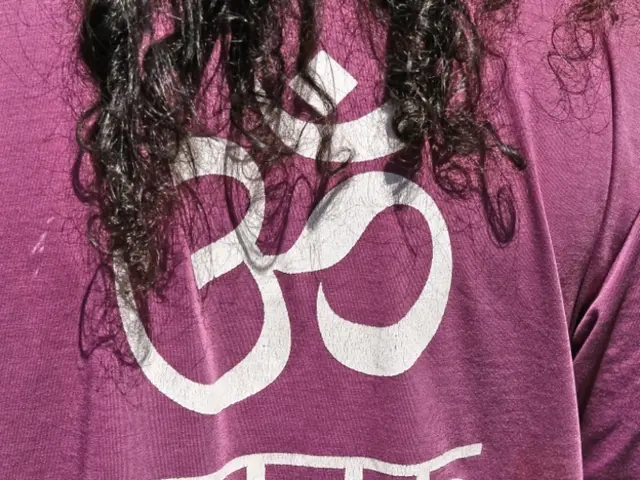US encounters the rapidly escalating Nimbus variant of the new coronavirus, originating in China. Here's a breakdown of what you need to understand.
🌟 Simplify Your Life, Boost Your Wellness - Sign Up for Our Life, On Point Newsletter! 🌟
Here's the lowdown on the latest health buzz: a new coronavirus variant named NB.1.8.1 is spreading across the globe like wildfire. It's been tied to a rise in cases in China and several Asian countries, with experts predicting a possible uptick in Europe too. And guess what? A potential summer wave could hit the US!
As of June 7, the Centers for Disease Control and Prevention (CDC) reports that NB.1.8.1 accounts for approximately one-third of all new Covid-19 cases. That's a hefty increase compared to just a month before, when it represented a mere 5% of new cases. So, what's the deal with this new kid on the block? Does it put a damper on vaccines and what precautions should we consider?
To provide some clarity on this, we chatted with our very own wellness guru, Dr. Leana Wen. Apart from being a whiz as an emergency physician and clinical associate professor at the George Washington University, she also served as Baltimore's health commissioner.
Let's talk turkey - NB.1.8.1:
The SARS-CoV-2 virus is constantly mutating, and it's only natural that we'll see new variants pop up. So, when a new one emerges that seems to be outdoing previous strains, it's crucial to ponder three burning questions: Does it cause more severe illness, is it more contagious, and do current vaccines still work against it?
NB.1.8.1, also known as Nimbus, is a descendant of the Omicron strain. The World Health Organization (WHO) has tagged it as a "variant under monitoring," but don't worry—research hasn't found that it leads to more severe disease compared to previous variants. That being said, there's a chance it might be more contagious – no worrisome indications suggest it's being spread differently compared to past variants though.
As for whether existing vaccines are still effective against this variant, the answer isn't definitely clear. WHO mentions lab data pointing to potential immune escape, meaning this variant could be less responsive to the immunity provided by vaccines or prior infection, hinting at a possible reduction in vaccine efficacy. However, given that NB.1.8.1 originates from strains against which vaccines have already demonstrated efficacy, it's likely that they'll still offer some protection.
As federal health officials decide the formulation of this fall's updated Covid-19 vaccine, they'll probably take NB.1.8.1 into account to ensure the new formula tackles this variant effectively.
Quick symptoms breakdown:
Symptoms appear to be similar to those linked to other variants, with a wide-ranging severity spectrum. Some may experience cold- or flu-like symptoms, such as fever, sore throat, fatigue, headache, and muscle aches, while others may exhibit allergy-like symptoms like a stuffy/runny nose. Some people may also develop a cough and difficulty breathing, along with nausea, vomiting, or diarrhea. Most people will recover, but some might become quite ill and require hospitalization. Plus, a contingent of individuals who contract Covid-19 could suffer from the post-viral condition known as long Covid.
So, could another summer wave really happen again?
Terribly sorry for the grim possibility, but yes, it could happen! A new wave might be triggered by a variant that's both more transmissible and has some degree of immune escape. Or, it could simply result from decreasing population immunity. Some experts suspect that the convergence of this new strain along with reduced recent activity might trigger a wave within the next few months.
Ever observed times of increased infection rates followed by recovery periods, only for cases to grow again? That's the pattern we've witnessed with multiple years of Covid-19 experience. It's entirely plausible that this pattern repeats itself this year.
Who should get the vaccine ASAP instead of waiting for the fall formulation?
Ah, a tricky question! COVID-19 vaccine recommendations continue to evolve, with the US Health and Human Services Secretary Robert F. Kennedy Jr. recently stating that COVID-19 shots are no longer recommended for healthy children and pregnant women. These vaccines seem to still be accessible for children, but reports suggest that pregnant women are facing challenges in obtaining them.
This, and other guidance, could change soon as Kennedy has reconstituted the panel of external experts who advise the CDC on vaccine recommendations and they'll meet in late June to discuss new recommendations. We're also yet to find out when a new round of vaccines will become available.
So, how can we approach this decision? Consider your risk of suffering severe outcomes if you were to contract Covid-19. Those 65 and over or individuals with chronic underlying medical conditions should consider grabbing their vaccine shots now, if they're eligible. That way, they'll have an extra layer of protection in case another summer wave arises, since the existing vaccine likely offers some residual protection against this variant. And they can also get another dose in the fall when the new formulation will most likely be rolled out.
As for those who are younger and generally healthy, some who have not received the 2024-2025 vaccine may opt to get it now before guidelines change, and they might no longer qualify. Remember to consult your primary care physician about your specific medical situation.
Last but not least - Prevention is Key:
Old school prevention practices are still relevant: maintain excellent respiratory hygiene, wash or sanitize your hands frequently, clean commonly touched surfaces, and ventilate your indoor space. If you have risk factors for severe disease, consider venturing into crowded indoor settings cautiously, and opt for a reliable mask when necessary. Furthermore, if you need to be around vulnerable individuals, it may be wise to avoid high-risk situations in the days leading up to your visit to reduce infection chances—not just for Covid-19, but for other respiratory illnesses too.
Stay strong, stay healthy, and stay connected with us for more actionable tips to supercharge your glorious life! 🌟🌟🌟
- Being mindful of mental health is crucial during these uncertain times. Taking time for self-care, including meditation and yoga, can help reduce stress levels and promote overall wellness.
- In addition to the ongoing pandemic, it's essential to keep mental health in check during this busy season. Current research shows that a balanced diet rich in fruits, vegetables, lean proteins, and whole grains can support both physical and mental health.
- Also, prioritize fitness and exercise, as regular physical activity can help boost the immune system and improve mental health. Whether it's a brisk walk, jogging, or a gym workout, find an exercise routine that fits your lifestyle and stick to it.







